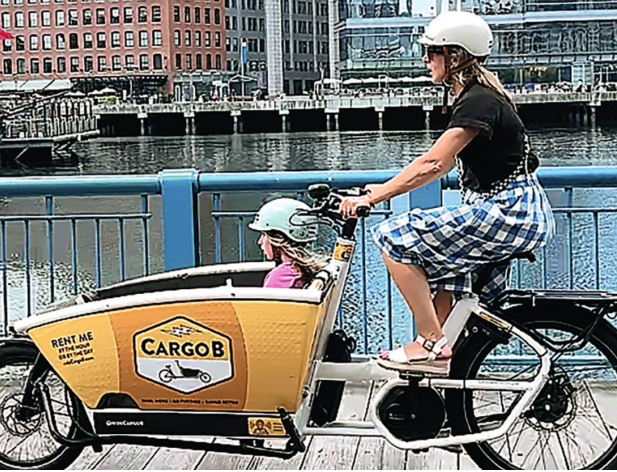
Seaport residents have a new option for mobility, and this one has space for your groceries.
The Boston-based startup, CargoB, works much like other bicycle sharing systems where users use a mobile app to check out a ride at and per-minute fee. What sets them apart is that they’re offering people a way to get around without sacrificing the ability to take stuff with them.
“I’m a big fan of BLUEbikes. The one challenge is that if you have someone to carry, or you have stuff to carry, it’s no longer for you,” said CargoB co-founder Dorothy Fennell. “So, we really see ourselves as ‘here’s the next level’”
Cargo
bikes have for a long time been a part of bike share programs in
European cities, said Fennell, who has a background in city planning,
but haven’t caught on here in the states.
The
style of bike has begun to be adopted by Bostonians, especially
parents, and is available at many area bike shops. But for many, the
cost of a cargo e-bike can be too high and space they take up can be
difficult to manage.
CargoB
bridges the gap between using a bikeshare to get somewhere and using a
car to transport something, ultimately shoring up road and parking space
in congested areas. Fennell says that anything like kids, dogs,
groceries, can be carried safely in the front-end buckets of these
e-bikes.
They’ve
deployed these Dutch style Cargo E-bikes in and around Boston to much
success, most recently setting up a station at the corner of Autumn Lane
and Boston Wharf Road.
CargoB have other stations in Jamaica Plain, Roslindale, Allston, Brighton, Porter Square, Winter Hill and East Arlington.
The startup has tripled its fleet since it began in May 2024. They’re currently working to expand the network’s footprint.
Fennell
says that they’re currently in talks with three big partners that will
significantly increase CargoB’s footprint in the city, and that other
Downtown residents should begin to see the bikes in their neighborhoods
within the month.
They’re also setting up a fleet management program with the city for employees to use for work in the community.
Much
like other bikeshares, users check out a CargoB bike using a phone
application and pay 25 cents a minute to ride. While the service is
largely intended for short distance trips around three miles, Fennell
says they see recreational use as well.
They
also offer a yearly $100 subscription, for those that find themselves
frequently using the service, that reduces the cost of all rides by 60%.
CarboB
differs from other bikeshares in that it’s not intended to be a service
to get you from places A to B, but rather a service to fulfill a round
trip, with the bikes “living” at their respective stations. The rental
includes a cable so that the bikes can be locked up at any bike rack or
post.
“This is not a free-floating system.
These
vehicles cannot just be left anywhere, because this can’t be a tripping
hazard,” added Fennell. “I can’t be here to give you something really
convenient at the expense of a neighbor who has a stroller or
wheelchair.”
“It’s not right and that’s not what I want to do. So, these really are very controlled assets”